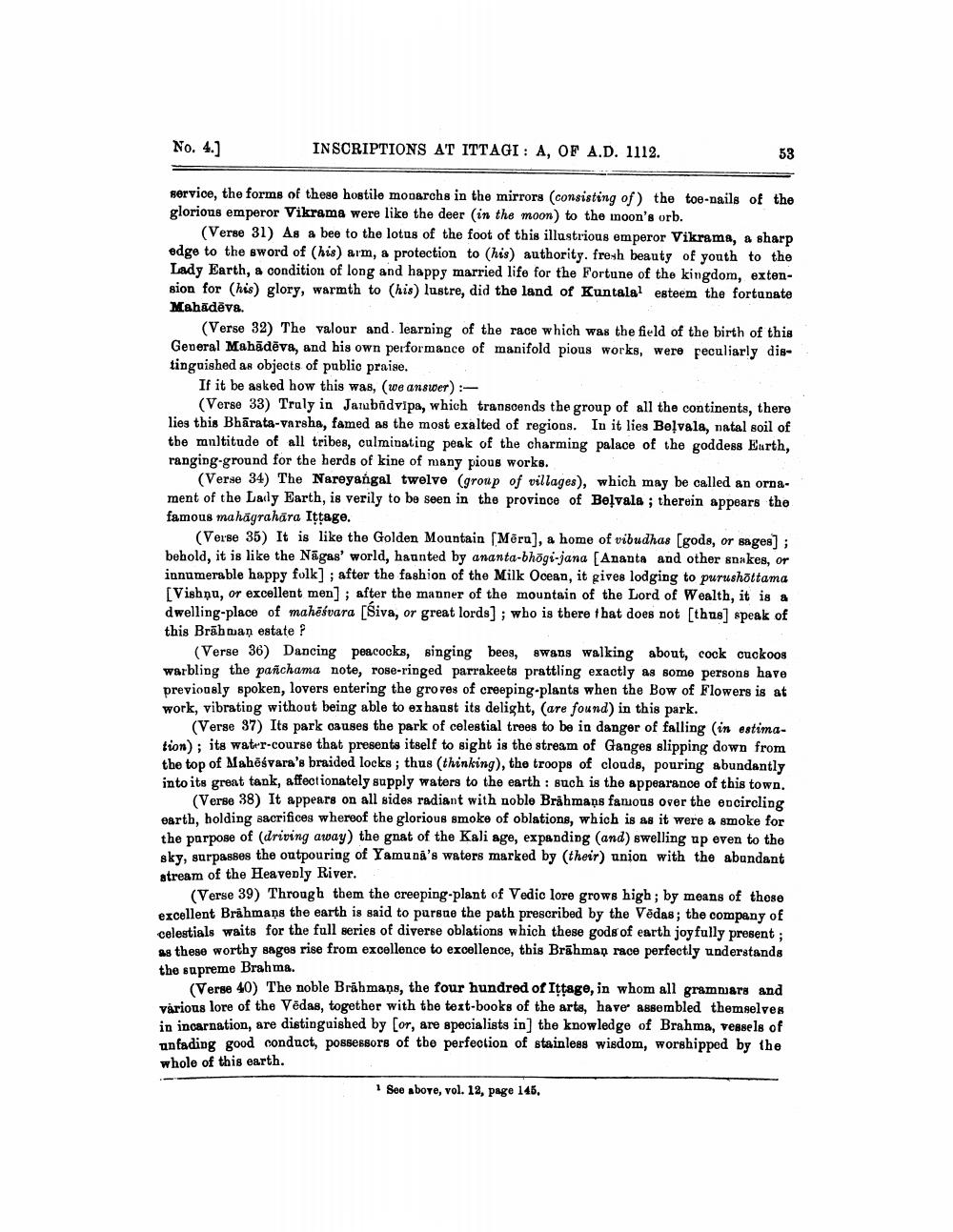________________
No. 4.]
INSCRIPTIONS AT ITTAGI: A, OF A.D. 1112.
service, the forms of these hostile monarchs in the mirrors (consisting of) the toe-nails of the glorious emperor Vikrama were like the deer (in the moon) to the moon's orb.
53
(Verse 31) As a bee to the lotus of the foot of this illustrious emperor Vikrama, a sharp edge to the sword of (his) arm, a protection to (his) authority. fresh beauty of youth to the Lady Earth, a condition of long and happy married life for the Fortune of the kingdom, extension for (his) glory, warmth to (his) lustre, did the land of Kuntala esteem the fortunate Mahadeva.
(Verse 32) The valour and learning of the race which was the field of the birth of this General Mahādēva, and his own performance of manifold pious works, were peculiarly distinguished as objects of public praise.
If it be asked how this was, (we answer) :
(Verse 33) Truly in Jambudvipa, which transcends the group of all the continents, there lies this Bharata-varsha, famed as the most exalted of regions. In it lies Belvala, natal soil of the multitude of all tribes, culminating peak of the charming palace of the goddess Earth, ranging-ground for the herds of kine of many pious works.
(Verse 34) The Nareyangal twelve (group of villages), ment of the Lady Earth, is verily to be seen in the province of famous mahagrahara Iṭṭage.
(Verse 35) It is like the Golden Mountain [Mera], a home of vibudhas [gods, or sages]; behold, it is like the Nagas' world, haunted by ananta-bhögi-jana [Ananta and other snakes, or innumerable happy folk]; after the fashion of the Milk Ocean, it gives lodging to purushottama [Vishnu, or excellent men]; after the manner of the mountain of the Lord of Wealth, it is a dwelling-place of mahesvara [Śiva, or great lords]; who is there that does not [thus] speak of
this Brahman estate ?
which may be called an ornaBelvala; therein appears the
(Verse 36) Dancing peacocks, singing bees, swans walking about, cock cuckoos warbling the pañchama note, rose-ringed parrakeets prattling exactly as some persons have previously spoken, lovers entering the groves of creeping-plants when the Bow of Flowers is at work, vibrating without being able to exhaust its delight, (are found) in this park.
(Verse 37) Its park causes the park of celestial trees to be in danger of falling (in estimation); its water-course that presents itself to sight is the stream of Ganges slipping down from the top of Mahesvara's braided locks; thus (thinking), the troops of clouds, pouring abundantly into its great tank, affectionately supply waters to the earth: such is the appearance of this town.
(Verse 38) It appears on all sides radiant with noble Brahmans famous over the encircling earth, holding sacrifices whereof the glorious smoke of oblations, which is as it were a smoke for the purpose of (driving away) the gnat of the Kali age, expanding (and) swelling up even to the sky, surpasses the outpouring of Yamuna's waters marked by (their) union with the abundant stream of the Heavenly River.
(Verse 39) Through them the creeping-plant of Vedic lore grows high; by means of these excellent Brahmans the earth is said to pursue the path prescribed by the Vedas; the company of celestials waits for the full series of diverse oblations which these gods of earth joyfully present; as these worthy sages rise from excellence to excellence, this Brahman race perfectly understands the supreme Brahma.
1 See above, vol. 12, page 145,
(Verse 40) The noble Brahmans, the four hundred of Iṭṭage, in whom all grammars and various lore of the Vedas, together with the text-books of the arts, have assembled themselves in incarnation, are distinguished by [or, are specialists in] the knowledge of Brahma, vessels of unfading good conduct, possessors of the perfection of stainless wisdom, worshipped by the whole of this earth.




